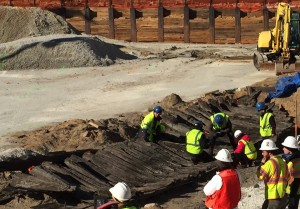
There’s something about things underground — invisible, chthonic, potentially revenant — that excites the imagination. Treasure is all very well, but buried treasure! The pulse quickens. Entire vanished civilizations might lie underfoot; who can know? Stranger things might be found, and have been: buried armies, buried books, buried voids that had been bodies. It was once believed, and by the learned, not the ignorant, that metals grew underground, seeds of gold that, nourished by rising vapors, grew like vegetable roots and stems, into veins and pockets of mineral wealth. And once mined, the gold, if the earth were left fallow, would grow again. Perhaps it could even be encouraged to grow, as we encourage growth above ground with manure and water. Such was the alchemists’ dream; we too dream strange thoughts and should not scoff.
Last Tuesday, the coldest day of winter so far, I went down to the waterfront, braving the below-zero windchill, to see what the upturned soil had revealed this time. This area of Alexandria was once part of the bed of the Potomac River. An eighteenth-century landfill project to improve the harbor moved the shoreline about two blocks eastwards; the present Lee Street was formerly named Water Street, being the last before the riverside.
The excavation at 220 South Union Street is the fruit of the city’s long-delayed waterfront redevelopment plan. John Carlyle’s 1755 warehouse (site of the city’s first brewery in 1770) has already been unearthed, as well as a privy and the usual miscellaneous odds and ends — coins, buttons, broken crockery. Then about a third of one side of a scuttled ship turned up.
This was not unexpected. Then as now, landfills used whatever was at hand and cheap. Boat don’t float? In it goes! The construction site was opened to the public for two hours so that folks could come and gawk at this ship that foundered down into the earth, blackened timbers like the ribs of some fallen Titan, its long, inevitable journey interrupted by a return to sunlight and the upper airs.